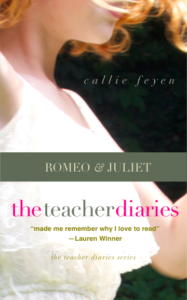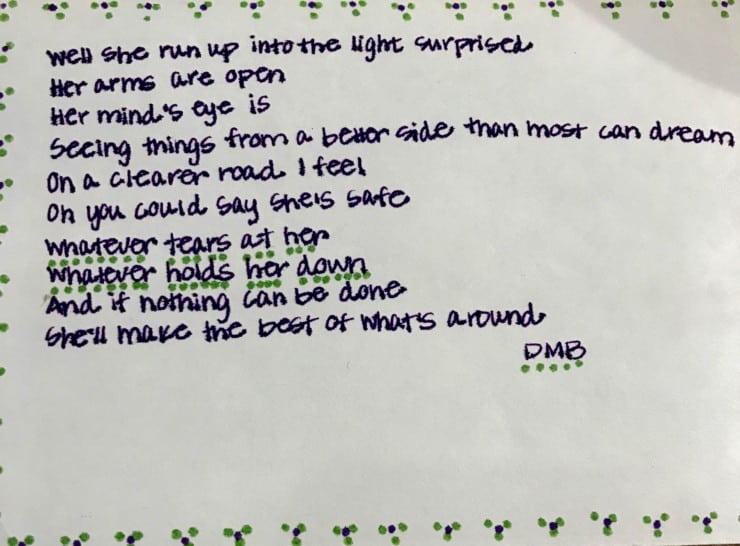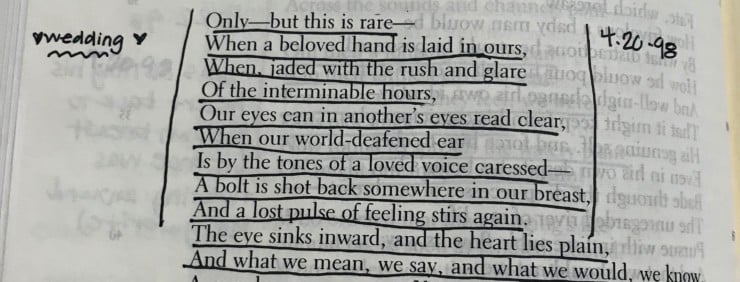My largest book of poems is The Norton Anthology of English Literature, Volume 2. I bought the book my spring semester of my senior year of college. I still have the receipt, nice and flat in the book. It’s dated 2-16-98, exactly eleven months before I’d be married. Jesse and I would say our vows a stone’s throw from the bookstore where I purchased the book — in the chapel where I followed him one dreary Wednesday morning.
I followed him not because he was going to chapel but because I thought he was cute. (I don’t want anyone getting the wrong idea about my priorities.)
The book isn’t all poetry. I also met Mary Wollstonecraft and George Elliot in its pages, and a seed of an idea of what I could become was planted within me reading their words. I also have a bookmark I made for myself with my favorite Dave Matthews Band lyrics:
“Well she ran up into the light surprised
Her arms are open
Her mind’s eye is
Seeing things from a better side than most can dream
On a clearer road I feel
Oh, you could say she’s safe
Whatever tears at her
Whatever holds her down
And if nothing can be done
She’ll make the best of what’s around”
I make no claims that I understand any British poetry, but I keep the book because inside I see the notes from a young girl who was delighted by words, and that delight made her want to try to understand them. The poetry was the equivalent of a cute boy heading towards chapel — fun to look at and worth sticking around to see what might happen.
I underlined, made notes in the margins, and dated most of what I read. In late February 1998, I read Lord Byron’s “Don Juan” and circled stanzas 92, 93, and 94 and wrote this note in the margin: “If you think you can make sense out of nature, you’re kidding yourself. It’s your APPETITE that drives you.”
That weekend prior, Jesse and his best friend Todd knocked on the back door of the house I shared with my four friends. They wanted to know if I wanted to ride around Grand Rapids in Todd’s VW Rabbit convertible. In February.
“What a dumb idea,” I said, as I grabbed a jacket and shut the door. It was a dumb idea, but on that day February played its classic trick, making all us Michiganders believe that spring was really here, thus making us all forget our woes and dance in the sunshine.
The boys, giddy with spring fever, decided it’d be hilarious to see how far they could walk on Reed’s Lake, the small body of water near campus that had frozen over. Another dumb and reckless idea, but I was not innocent of February’s tantalizing ways. I watched them and remembered an afternoon when I sat on a frozen wave in Lake Michigan with three of my friends, the ice seeping though my jeans and sending shivers up to my neck, and I was unsure whether they came from cold or from fear.
I am, and always have been, suspicious of nature’s ways and know there’s no use in trying to make sense of it. I also understand the hunger for experience, mischief, adventure, and love when the snow falls hard, when the sun comes out on a day it’s not supposed to, when I can see a thunderstorm approaching, pulsing with light.
On March 13, 1998, I underlined these sentences from Percy Bysshe Shelley’s essay titled “A Defence of Poetry”:
In the youth of the world, men dance and sing and imitate natural objects, observing in these actions, as in all others, certain rhythm or order. And, although all men observe a similar, they observe not the same order, in the motions of the dance, in the melodys of the song, in the combination of language, in the series of their imitations of natural objects.”
In the margin next to Shelley’s words, I wrote, “Can this mean poetry can be interpreted differently?” Decades later I’m not sure, but I know sharing the same poem with kindergarteners or third-graders yields different responses. I see something different — and true — each time I read a poem.
And on April 20, 1998, I underlined eleven lines from Matthew Arnold’s poem “The Buried Life,” and with hearts surrounding it, wrote, “wedding” in the margin.
“Only—but this is rare—
When a beloved hand is laid in ours,
When, jaded with the rush and glare
Of the interminable hours,
Our eyes can in another’s eyes read clear,
When our world-deafened ear
Is by the tones of a loved voice caressed—
A bolt is shot back somewhere in our breast,
And a lost pulse of feeling stirs again,
The eve sinks inward, and the heart lies plain,
And what we mean, we say, and what we would, we know.”
And so it was. I brought the poem to my Aunt Lucy, who owned a printing and mailing shop in Rockford, Michigan, along with stationery my mom and I found in an art supply store in Chicago. Lucy printed Arnold’s words on the paper that guests would hold while Jesse and I promised to love each other until one of us is no longer.
I’ve gone back to read “The Buried Life” time and again to see if I understand more than what I was promising Jesse and hoping for our marriage. I underlined well over half of the 100-line poem, but there are no notes save for “wedding” for lines 76-87.
I don’t know if I can make sense of it, but I’m not sure I can made sense of 20 years of marriage either. I know I can’t made sense of Jesse. I think that’s OK — good, even. I think the poem, like my marriage, like Jesse, holds enough delight and mystery for me to latch on to and return to again and again.
And again.
Try It
For this week’s poetry prompt, write about something (or someone) equally delightful and mysterious that you are filled with gratitude for.
Featured Poem
Thanks to everyone who participated in the last poetry prompt. Here’s one from Florence Brooks we enjoyed:
Watching
The light has come.
The sun slowly rising into a canopy of blue casting its golden rays
on ancient cypress and native pine.
A heron stands at attention
waiting to salute the day.
A blackbird shouts a hearty welcome
stirring slumbering girls with its raucousness.
And I wait and watch for the light
to penetrate the darkness,
to reach places I cannot see,
yet I believe are here.
I wait and watch knowing
that light will come again.
Photo by mattosberger, Creative Commons. Post by Callie Feyen, author of The Teacher Diaries: Romeo and Juliet.

—JJN Mama, Amazon reviewer
- Poetry Prompt: Courage to Follow - July 24, 2023
- Poetry Prompt: Being a Pilgrim and a Martha Stewart Homemaker - July 10, 2023
- Poetry Prompt: Monarch Butterfly’s Wildflower - June 19, 2023



Richard says
This is so lovely, Callie. I like that you juxtapose the mystery(ies) of marriage and nature. It takes love, time, and patience to appreciate both. It takes a lot of patience I think to be married to a writer.
This Thursday my wife and I celebrate 18 years of that appreciation for the mysteries of one another.
Callie Feyen says
I am quite certain my husband would agree that it takes a lot of patience to be married to a writer. I should probably let him respond to this comment. 🙂
Congratulations on 18 years of marriage this week, and thank you for your kind words!
Richard says
Years
…and as our years go by, you say
it seems like yesterday or forever.
I have no years for us.
Like Wisteria we drift in time,
we can not explain where
we were joined or when or even exactly how.
Callie Feyen says
I like the “or” in “yesterday or forever.” Many times, while explaining a long relationship, I hear, “yesterday AND forever,” but the “or” here gives me pause. Maybe sometimes it’s yesterday; others it’s forever. It cannot be both at the same time.
deb y felio says
a tiny thing
at birth
delicate
a robin’s egg
a small
cocoon
struggling through
a too tough
world
becoming
lightness
and light
sputtering
at times
to breathe
mounting
obstacles
battered
rising
victorious
shining
persevering
loving
witness
my
little
sister
Callie Feyen says
What a kind tribute to a sibling. I like that you don’t name her until the last lines. I also like the image of the robin’s egg. I believe it made “struggling through/a too tough/world” really pop.
Thank you for sharing.
Kimberly Knowle-Zeller says
The darkness and the light stretch before me, together.
Both inviting, both transforming.
The snow covered trees call me,
the moon glistening above.
Each branch heavy with snow.
I walk towards the beauty.
It surrounds me.
I hear crunching snow, twigs breaking, a cat scurrying away.
Then I hear silence.
Reminding me that I am small.
Florence says
Oh my goodness! I am so honored you featured my poem. What a delight for me!
Here’s another with the theme of gratitude. I call it: Grace-filled Journey…
The pulse of a songbird,
dappled light pushes through trees,
the house lies quiet,
and my heart is full with the anticipation of a new day.
It’s this grace-filled journey that sprinkles hope in my path each day
awakening me to endless possibility.
May I treasure the gift, the unfolding mystery, the promise
for
all is amazing and all is grace!